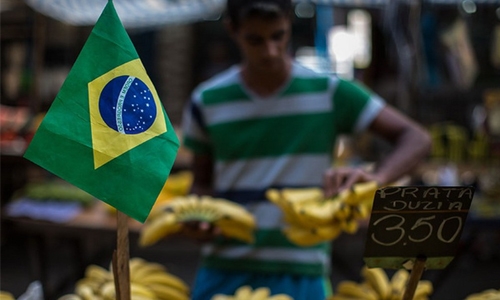Brazil can’t afford to ignore its dire economic outlook
Driven by anger, resentment and a desire to obliterate the establishment, Brazilians chose on Oct. 7 two presidential candidates at the extreme ends of the ideological spectrum. Jair Bolsonaro, a hard-right firebrand who has spoken fondly of the country’s bygone military dictatorship, and the left-wing Fernando Haddad, from the corruption-mired Brazil’s Worker’s Party, will now face off in a second round of voting on Oct. 28. The next president will confront daunting challenges. Chief among them is a limp economy that could spiral into a major fiscal crisis. The economy has not fully recovered from the recession of 2015-16, the worst ever to hit the country. Growth has resumed, but not enough to create jobs for the more than 13 million unemployed Brazilian workers. Inflation has been contained, despite recent financial market turbulence, but wages are stagnant.
Most ominous, Brazil has high and uncontrolled deficits and a ratio of debt to gross domestic product that are unsustainable. These challenges require comprehensive action: spending cuts and tax increases, accompanied by pension reform. Without urgent moves, debt could reach 100% of GDP in the next two years, leaving the government unable to finance itself. A fiscal crisis would tip the country back into recession, slashing even more jobs in an already grim labor market. Bolsonaro or Haddad will have no choice but to face up to this dire outlook. But so far, neither candidate seems willing to do so. Although austerity could hurt growth in the short term, the only way to reduce the widening gap between revenues and expenditures is by paying the price of a weaker economy now to guarantee the return of stability and growth later. The politics of the moment will complicate this prescription.
The next president will face a highly fragmented Congress; 30 political parties will have seats in the next session, up from 28. And neither candidate has the right political experience to build stable coalitions. Bolsonaro’s party, the Social Liberal Party, known as the PSL, made big gains on Oct. 7, winning 52 seats to the lower house of Congress. It’s now the second biggest party in Congress, behind Haddad’s PT. And Bolsonaro’s supporters also look likely to win governorships in key states, such as São Paulo and Minas Gerais, Brazil’s most populous state, in the runoff on Oct. 28. But Bolsonaro has promised to halve the number of cabinet positions to reduce costs, and this may hurt his ability to forge a stable coalition. Brazil has some 29 cabinet posts — much too many. Coalitions are built by handing off cabinet jobs to allied parties. If there are fewer cabinet positions on offer, the incentive for political parties to align with the president is lowered, making legislation much more difficult to pass.
Haddad’s PT holds 56 seats in Congress, a decrease from 2014 but still the most in Congress. As president, he would face hostility from Bolsonaro-supporting governors, who have a lot of influence in Congress, helping to shape policies or hampering reform. Haddad, if elected, would also have to confront anger towards his party for recent corruption scandals. Many former members of PT’s leadership are in prison, including former President Luiz Inácio Lula da Silva. Despite these political challenges, we still have little idea what the candidates would do for the economy, less than three weeks from the runoff. In previous elections, candidates presented comprehensive economic plans. Not this time. Bolsonaro and Haddad have been vague and general when discussing the economy.
To be fair, Brazilian voters have been mainly concerned about corruption and violence. Rio de Janeiro, which hosted the Olympic Games in 2016, has had such a spike in violence that federal government ordered a military intervention. Brazilians have wanted to hear candidates’ plans for cleaning up the government and restoring law and order. Bolsonaro, in choosing a prominent, pro-market chief economic adviser, has hinted that he plans to embrace a more liberal economic philosophy. But he is known to have nationalistic views, with a preference for state intervention to drive growth — not unlike policies that the PT has pursued in the recent past. Some observers appear to believe that his views have changed — but in the absence of detailed plans, there’s little reason to believe that.
Haddad has also failed to offer much substance. Although he has vowed to study the pension crisis, he has not recognised that reform is necessary. Moreover, he has defended the need for a strong public investment program to create jobs, but he has not explained where the money will come from. Haddad has talked loosely about the need for tax reform, but there’s no clarity on what measures it would entail. It is likely that he would need to bow to the wishes of the left-wing PT leadership and thus avoid politically unpopular fiscal reforms.
Following Bolsonaro’s strong showing on Oct. 7, the currency rallied and stock markets rose. Markets dipped on Oct. 10, as they did around the globe, but enough investors appear to believe that Bolsonaro, if elected, will deliver pension and fiscal reform. Yet we don’t have good reason to be sure. No matter what happens on Oct. 28, the economic outlook is bleak. Brazil’s problems are far from over, and the two presidential candidates don’t appear to have the plans or the political capital to make the necessary reforms. There is still too little to cheer in Latin America’s largest economy.
Related Posts

